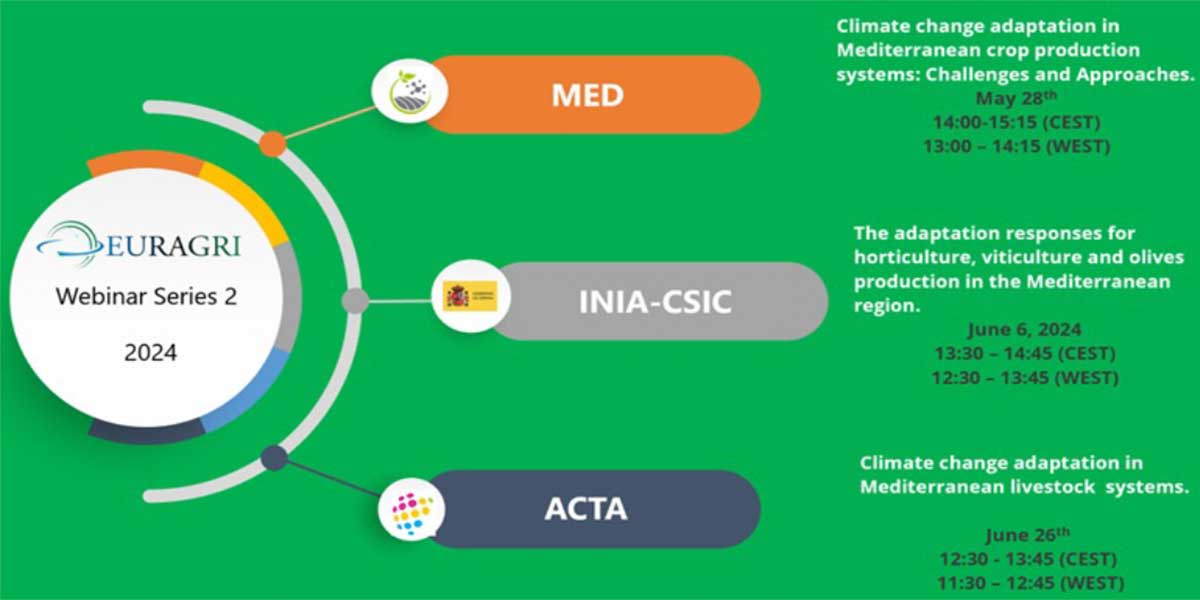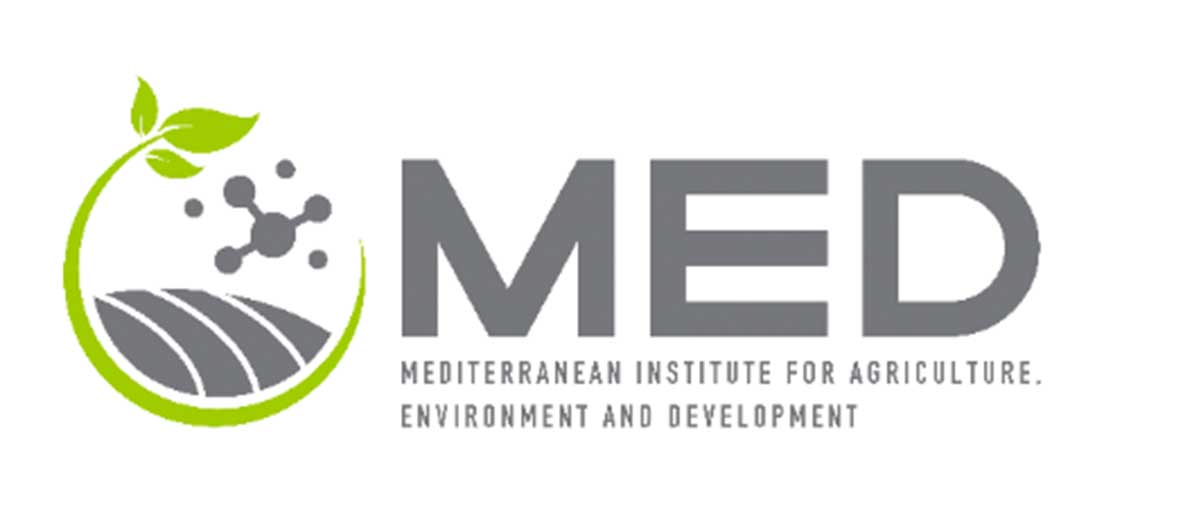THE EURAGRI WEBINAR SERIES 2
A series of three webinars hosted by MED Uevora (Pt), ACTA (Fr), and INIA-CSIC (Sp) on
CLIMATE CHANGE ADAPTATION FOR AGRICULTURE AND FOOD SYSTEMS IN THE MEDITERRANEAN REGION

The Mediterranean region has and continues to face several significant adaptation challenges for agriculture and food production due to climatic, various environmental and socioeconomic factors. The Mediterranean region is particularly vulnerable to climate change impacts. Increasing temperatures, changes in precipitation patterns, and more frequent extreme weather events such as droughts and heat waves pose significant challenges to agricultural production. Soil erosion, desertification, and land degradation are ongoing problems. Biodiversity loss threatens the resilience of farming systems. Socioeconomic factors such as rural poverty, limited access to markets and financial resources, and lack of education and training opportunities reduce the ability of farmers to adapt to changing conditions and adopt sustainable agricultural practices.
The three hosts have assembled webinars on the developments in climate change adaption for crop, livestock, and the Mediterranean region’s horticulture, viticulture and olive sectors. Participants will be briefed on the progress of policy and research in addressing this disruptive and critical challenge for the transition to sustainable farming and food systems. More details on the individual webinars are provided below.
Please note a video and summary document of each webinar will be uploaded to the Euragri website in due course.
Booking
Webinar 1: Climate change adaption in the Mediterranean crop production systems. May 28, 2024. 14:00 – 15:15 (CEST) 13:00 – 14:15 (WEST) Completed on May 24.
Webinar 2: The adaptation responses for horticulture, viticulture and olive production in the
Mediterranean region. June 6, 2024. 13:30 – 14:45 (CEST) 12:30 – 13:45 (WEST) Link
Webinar 3: Climate change adaption in the Mediterranean livestock systems. June 26, 2024. 12:30 –
13:$5 (CEST) 11:30 – 12:45 (WEST) Booking TBC

Climate Change adaptation in Mediterranean crop production systems. Challenges and Approaches
In this first webinar of the second Euragri series, MED will provide an overview of the main challenges of accelerating climate change and summarise possible adaptation approaches in annual, broad-acre cropping systems. Options of Nature-based Solutions (NbS) and how the EU promotes such solutions will be discussed. Considered as NbS, the concept of Conservation Agriculture and how it contributes to climate change adaption will be detailed.
Date: 28th May 2024
Time: 14:00-15:15 (CEST) 13:00-14:15 (WEST)
Moderator: Fátima Baptista, MED – Mediterranean Institute for Agriculture, Environment and Development<
| José Rafael Marques da Silva, MED | Introduction |
|---|---|
| Gottlieb Basch, MED | Challenges for CC adaptation in Mediterranean crop production systems. |
| Michal Nekvasil, DG Clima | EU policies fostering nature-based solutions for climate resilience |
| Mathieu MARGUERIE, ARVALIS | CAMA – Soil conservation agriculture: feedback from participatory and applied research in Mediterranean conditions. |
| Fátima Baptista, MED | Closing |
Three critical take-home messages
The consequences of climate change will affect the Mediterranean region more severely than other European regions. Responses to this reality must include several strategies that address its unique challenges.
Nature-based solutions (NbS) can significantly help agriculture adapt to climate change by enhancing resilience, improving productivity, and maintaining ecosystem services.
Mediterranean cropping systems in conservation agriculture (CA) face two main challenges: The arid climate makes it difficult to grow intercrops, and the absence of tillage complicates weed management. The results from the CAMA project show that the CA systems tested are efficient: they improve water efficiency, increase the organic matter levels and lead to greater resistance to erosion. There is no uniform response concerning nitrogen efficiency, but we can see room for improvement in reducing its use. Nevertheless, CA systems are dependent on phytosanitary products.

The adaptation responses for horticulture, viticulture and olives production in the Mediterranean
region
INIA-CSIC in this webinar, will focus on horticulture, including olive groves, wine grapes and fruit tree crops in the Mediterranean region, taking into account that the vulnerability of these sectors to the modification of agro-climatic conditions depends on the expected regional climate change, water management, and the sectors’ ability to adapt to the current conditions.
Date: 6th June 2024
Time: 13:30-14:45 (CEST) 12:30-13:45 (WEST)
Moderator: Rocio Lansac, INIA-CSIC
| Ali Rhouma, PRIMA | Opening. – Headlines of the Future4Prima project |
|---|---|
| Antonio Manzaneda, UJA | SOILOLIVE. – Soil health and olive oil quality: a holistic model. |
| Alfonso Dominguez, UCLM | SUPROMED. – Improvement of the economic and environmental sustainability of agricultural Mediterranean systems. The SUPROMED project. |
| Iban Eduardo, IRTA | FREECLIMB. – The invaluable treasure of germplasm kept in repositories as a common legacy to be exploited for the benefit of all Mediterranean Basin fruit sectors. |
| Rocio Lansac, INIA-CSIC | Closing |
Three critical take-home messages:
After over five decades of extensive agriculture, many olive groves in the Mediterranean region face a critical environmental situation. The land is degrading, biodiversity is declining, and functionality is being lost, all of which may have already affected the quality and safety of olive oil.
Properly managing irrigation systems and soil is as crucial as providing farmers and technicians with models and tools for advising them in the decision process.
New varieties are developed by breeding activities to match stakeholders’ expectations, bringing characteristics of resistance to diseases or abiotic stresses from old low-commercial varieties to more modern ones.

Climate change adaptation in Mediterranean livestock systems.
In this third and last webinar of the second Euragri series, ACTA will focus on some of the main challenges the Livestock sectors are facing in the Mediterranean area. The webinar will cover diversified study cases in different Mediterranean countries and will address different scale, from the buildings to the territory. Finally, it will show a wide variety of solutions and the different levers livestock breeders needs to activate to sustain productive herds in the Mediterranean Region in a climate change context.
Date: 26th June 2024
Time: 12.30 – 13:45 (CEST), 11:30 – 12:45 (WEST)
Moderator: Adrien Guichaoua, ACTA
| Adrien Guichaoua, ACTA | Opening |
|---|---|
| Rui Charneca, MED (PT) | Contribution of SUMO project to livestock production sustainability in the “Montado”
Ecosystem. |
| Agustin del Prado, BC3R (ES) | ISAGE: Modelling adaptation measures to cope with temperature stress in Mediterranean small ruminant systems. |
| Morgane Lambert, IDELE (FR) | BATCOOL: Buildings adapted to high temperatures for goats, meat sheep and milking sheep. |
| Adrien Guichaoua, ACTA | Closing |
Three critical take-home messages:
- Using “omics” and other tools can increase livestock productivity, health and welfare in the “Montado”. Precision livestock farming can optimize resource use, livestock and pasture productivity, and soil conservation in the “Montado”. Livestock production in the “Montado” is compatible with biodiversity conservation and increase.
- Small ruminants in Mediterranean countries have to cope with both heat and cold stress events due to cold spells in winter and heat waves in summer. Modelling allow us to i) simulate the effect on animal productivity loss and associated emissions, ii) test management strategies (e.g. changes in diet) that are focused on alleviating the effect of cold or heat stress conditions on losses of animal performance, iii) simulate potential trade-offs (or synergies) with climate mitigation (i.e reduction in GHG emissions).
- The challenge with buildings is more summer than winter, and the forecasts show that this is set to continue. We need to plan more and more for modular buildings to adapt to all types of weather.